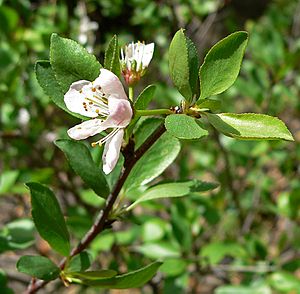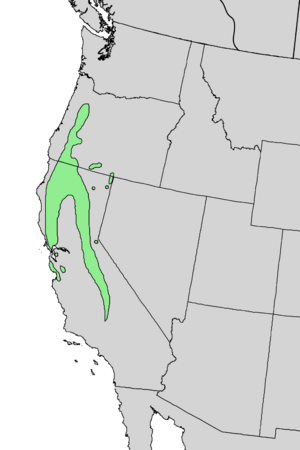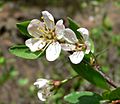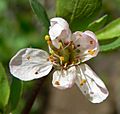Klamath plum facts for kids
Quick facts for kids Klamath plum |
|
|---|---|
 |
|
| Leaves and flowers (detail) | |
| Conservation status | |
| Scientific classification | |
 |
|
| Natural range of Prunus subcordata | |
| Synonyms | |
|
Prunus subcordata, often called the Klamath plum, Oregon plum, Pacific plum, or Sierra plum, is a type of plum tree or shrub. It belongs to the Prunus group, which includes cherries, peaches, and almonds. This plant grows naturally in the western United States, mainly in California and western and southern Oregon.
You can often spot Prunus subcordata growing in forests. It prefers lower elevations near the coast but also thrives in mountain ranges like the Sierra Nevada and Cascade Range. It can be found at heights from about 100 to 1,900 meters (about 330 to 6,200 feet) above sea level. One specific type, called the Klamath plum (P. subcordata var. subcordata), is also found in Washington.
The natural area where Prunus subcordata grows covers the region around the San Joaquin Valley in California. Other similar plum species, like P. emarginata, are also found in the Pacific Northwest states.
Contents
What Does the Klamath Plum Look Like?
The Prunus subcordata is a deciduous shrub or a small tree. Deciduous means it loses its leaves each year, usually in the fall. It can grow up to 8 meters (nearly 27 feet) tall. This plant can sprout new shoots from its roots, forming thick, spiny patches.
Bark and Leaves
The bark of the Klamath plum is gray and has horizontal brown marks called lenticels. These marks help the plant breathe. Its bark looks a bit like that of a cultivated cherry tree.
The leaves are about 2.5 to 5 centimeters (1 to 2 inches) long. They are dark green and turn red before they fall off in autumn. The edges of the leaves are slightly toothed.
Flowers and Fruit
In the spring, the plant produces beautiful white or pinkish flowers. These flowers grow in small groups of one to seven.
The fruit is a small, plum-like drupe. A drupe is a fruit with a hard pit or stone inside, like a peach or cherry. The plums are about 15 to 25 millimeters (0.6 to 1 inch) long. They can be red or yellow and become ripe in late summer. These plums are small and have a tart taste, but they are safe to eat.
Names of the Plum
The different common names for Prunus subcordata often relate to the mountain ranges or places where it grows. For example, "Klamath plum" refers to the Klamath Mountains, "Oregon plum" to Oregon, and "Sierra plum" to the Sierra Nevada mountains.
The Concow tribe, a Native American group, calls this tree gos’-i in their Konkow language.
Images for kids
See also
 In Spanish: Prunus subcordata para niños
In Spanish: Prunus subcordata para niños





